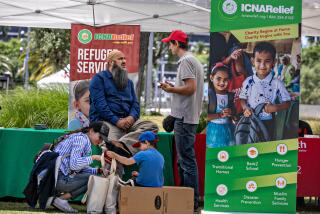Iraqi Widows Expand Horizons
- Share via
KARBALA, Iraq — In the midst of daily violence in Iraq, the effort to seed democracy goes on. It is painstaking and incremental work.
On Monday, the U.S. civilian administrator for Iraq, L. Paul Bremer III, packed his full security detail onto a Black Hawk helicopter and flew 60 miles south of Baghdad to visit 80 scarved women in the city of Karbala.
In the heartland of Shiite Muslim fundamentalism, the women have done something improbable, founding the Karbala Women’s Rights Center with $163,000 from the U.S. Agency for International Development. USAID has been funding and promoting such centers in several major Iraqi cities, and Bremer came for the official opening in Karbala.
Most of the women are impoverished, having been widowed or left without fathers and brothers to support them after Iraq’s wars and Saddam Hussein’s killings of thousands of Shiite men. The women came to the center with a single goal: to learn a marketable skill.
For most of them, notions of democracy are secondary.
“This is only my third visit here. I came because they told us they would give some training, they would teach us and support the Iraqi women,” said Nawal Jabar, 44, whose husband was killed more than a decade and a half ago in the Iraq-Iran war, leaving her to care for their five children.
Like most widows, she must rely on the beneficence of male relatives, leaving her all but powerless in her society.
“It’s a very bad situation ... but I am hoping I can get a job here so that I can support my children. I will do anything to support my family,” she said, adding, like many of the women, that she planned to take sewing classes.
Bremer, defying the desert dust in an immaculate navy suit, toured the center’s Internet cafe, library and sewing room with a small group of journalists.
After the visit, Bremer said women needed to play a significant role in Iraq’s new government.
“In order for women to have the authority that they are in many ways asking for ... you have to get more than token participation,” he said. “It has to be a critical mass, where the women have enough other women so they draw confidence from each other’s presence.”
Nevertheless, Bremer said he was uncomfortable with a provision in the draft law for governing Iraq after the U.S. hands back sovereignty that would require 40% of the representatives in a transitional assembly to be women. The assembly is slated to be chosen in June.
“I’m uneasy with quotas as a philosophical matter,” he said, but added, “if the consensus is that we should have quotas, I’m prepared to go along.”
Bremer indicated, however, that he would not necessarily go along with the U.S.-appointed Iraqi Governing Council if it insisted on making Islamic Sharia law the basis for Iraq’s legal system -- as some council members have suggested.
Sharia gives women fewer rights than men in domestic areas such as marriage, divorce, child custody and inheritance. The current draft law gives equal rights to women and says that Islam will be one of the inspirations for Iraqi law, but makes no mention of Sharia.
“It can’t become law until I sign it,” said Bremer, who must approve all measures passed by the 25-member council.
Bremer encouraged the women in Karbala to participate in building their country’s civic life and pledged that the United States would stand by them.
“Barriers placed in the way of women are barriers to growth in the Arab world.... No state can compete if half of its people are marginalized or disengaged,” he said.
“An educated wife and mother is a better wife and mother, no husband is better off because she is chained by ignorance. No son is better off because his mother cannot read,” he said.
While Bremer’s remarks focused on U.S. efforts to foster positive change in the life of Iraqis, the logistics of his trip highlighted the difficulties of trying to do that while protecting U.S. occupation forces in an increasingly fraught environment.
As is now usual, Bremer’s destination was not disclosed to journalists until minutes before departure. Accompanied by nine special security guards, armed with high powered M-16 rifles, he and his staff and reporters boarded two Black Hawks. Escorted by two Apaches, the aircraft flew low and fast in an effort to evade shoulder-fired missiles and other weapons that insurgents have used to bring down U.S. helicopters.
They rose only to clear power lines and avoid flocks of birds, racing barely 50 feet above the ground, hardly higher than some of the minarets they flew by.
Once inside the women’s rights center, Bremer was his usual public self. Like a politician on the campaign trail, he greeted each of the women working at the Internet cafe, asked a question of each one bent over a sewing machine and engaged children in the day-care center in conversation.
He stopped by one woman working at a computer. “What do you do?” he asked.
“I’m a school teacher,” she answered.
“Do you have a computer at your school?” queried Bremer.
“No,” she said.
“Not yet,” he replied, the American optimist.
She looked doubtful. “Inshallah,” she answered. God willing.
More to Read
Sign up for Essential California
The most important California stories and recommendations in your inbox every morning.
You may occasionally receive promotional content from the Los Angeles Times.













